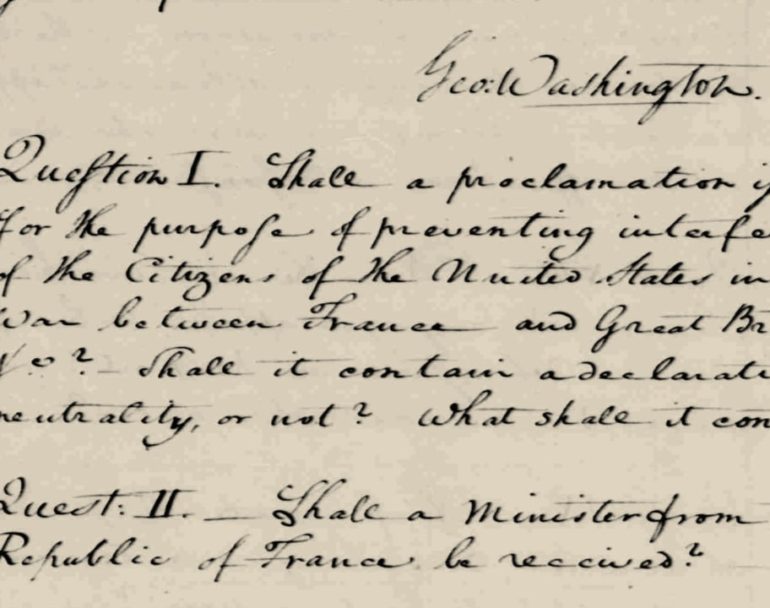
The Neutrality Proclamation in a Nutshell
By: Dave Benner
Today in history, on April 22, 1793, President George Washington issued a statement that the United States would remain neutral in the ongoing conflict between France and Britain. Given that his decision kept the United States out of a war, why was it so controversial?
In 1778, the fledgling United States and France agreed to two treaties, one of which committed both countries to mutual military assistance. As France became consumed by its Revolutionary Wars, the country called upon the support of its North American ally.
Congress and Washington’s cabinet were completely split on the issue. Hamilton and the Federalists thought it a wise move to keep the young country out of European conflicts, but the Jeffersonian Republicans thought doing so would be a violation of their treaty with France.
As he did on many occasions, Washington sided with Hamilton, releasing a proclamation holding that the United States would “carefully avoid all acts and proceedings whatsoever” that may involve the U.S. in a European war.
Washington asked French diplomat Edmond-Charles Genet to be recalled. However, given Genet’s inability to secure American aid to France, he feared for his life at the height of France’s Reign of Terror and was thus granted asylum in the United States for the rest of his life.
After the Neutrality Proclamation, as it was called, was issued, both Hamiltonian Federalists and Jeffersonians dug in their heels, embroiled in an argument over the constitutionality the gesture.
As the debate – later dubbed the Pacificus-Helvisius Debates – raged, Alexander Hamilton composed a series of essays, under the name “Pacificus,” that backed the administration’s policy. His position hung upon three main arguments.
First – that the treaty with France was a defensive treaty that compelled no support for offensive wars, and that it was secured with France’s previous government under the Bourbon monarch Louis XVI – who had been since put the guillotine.
Second – that peace and neutrality was the default condition before war had been declared, and thus Washington was simply reiterating the status quo rather than usurping Congressional authority.
And third – that the president possesses the authority to preserve peace, and that Washington’s proclamation was part of his executive prerogative to determine the course of foreign affairs.
As part of Washington’s cabinet, Jefferson pleaded with James Madison to write and publish a series of essays that articulated an oppositional perspective against the Neutrality Proclamation. Though he was hesitant, Madison eventually agreed, and released a series of essays under the name “Helvidius.”
Madison’s case against the Neutrality Proclamation boiled down to several counterpoints.
First – that all executive powers other than treaties require the existence of laws to be executed.
Second – that the Neutrality Proclamation was an infringement upon the legislative power since only Congress could determine whether or not to declare war. Additionally, allowing the executive a monopoly on the interpretation of treaties endangered Congress’ power to exercise its constitutional authority.
Third – that France’s financial and military support for the War against Britain was secured through the aid of the French people, who paid into its treasury, rather than through its kingly head. Widely understood legal mantra under the law of nations, Madison wrote, held that treaties do not expire upon the political transformation of a country.
And fourth – that the power to declare neutrality would rupture the constitutional bounds of the presidential office, setting a dangerous and kingly precedent.
Whatever one thinks about the constitutional permissibility of Washington’s proclamation, it was an event that widened the gulf between the Federalists and Republicans. Indeed, Jefferson was so incensed over the Neutrality Proclamation that the event contributed to his resignation from Washington’s cabinet as secretary of state. From that point forward, Jefferson would attempt to undermine the Federalists in a more direct way.
The Neutrality Proclamation also contributed to the outbreak of the Quasi-War with France a few years later, where the young United States were pitted against their former ally.